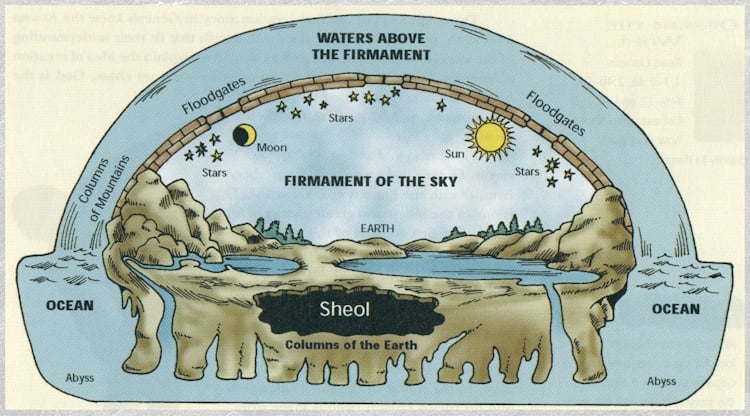In a Facebook group I am a part of, Geoffrey Jones shared this helpful collection of excerpts from Jewish and Christian texts indicating that the ancient interpreters of the Bible understood the firmament to be solid:
“Let there be a firmament in the midst of the waters, the middle layer of water solidified,and the nether heavens and the uppermost heavens were formed. Rab said: [God’s] handiwork [the heavens] was in fluid form, and on the second day it congealed; thus Let there be a firmament means ‘Let the firmament be made strong*. R. Judah b. R. Simon said: Let a lining be made for the firmament, as you read, And they did beat the gold into thin plates…R. Simon said: The fire came forth from above and burnished the face of the firmament.”
– Gen. Rab. 4:2
“R. Phinehas said in R. Oshaya’s name: As there is a void between the earth and the firmament, so is there a void between the firmament and the upper waters, as it is written, Let there be a firmament in the midst of the waters, meaning, midway between them. R. Tanhuma said: I will state the proof. If it said, And God made the firmament, and He divided between the waters . . . which are upon the firmament, I would say that the water lies directly upon the firmament itself.”
– Gen. Rab. 4:3
“…when they had built the tower to the height of four hundred and sixty-three cubits. And they took a gimlet, and sought to pierce the heaven, saying, Let us see (whether) the heaven is made of clay, or of brass, or of iron.” – 3 Apoc. Bar. 7
“But after that he makes the firmament, that is, the corporeal heaven. For every corporeal object is, without doubt, firm and solid; and it is this which “divides the water which is above heaven from the water which is below heaven.” – Origen. Homily on Genesis
“If the nature of the elements is taken into consideration, how it is possible for the firmament to be stable between the waters? The one is liquid, the other solid; one is active, the other, passive.” – Ambrose. Hexameron, BkII Ch 2.48
“…’And he called the firmament, heaven.’ In a general way, He would seem to have said above that heaven was made in the beginning so as to take in the entire fabric of celestial creation, and that here the specific solidity of this exterior firmament is meant.” – Ibid. 2.62
“This firmament cannot be broken, you see, without a noise. It also is called a firmament because it is not weak nor without resistance…the firmament is called because of its firmness or because it has been made firm by divine power,..”
– Ibid. 2.62
“They must certainly bear in mind that the term “firmament” does not compel us to imagine a stationary heaven: we may understand this name as given to indicate not that it is motionless but that it is solid and that it constitutes an impassable boundary between the waters above and the waters below.”
– Augustine. The Literal Meaning of Genesis, BkII Ch.10
See also Paul H. Seely, “The Firmament and the Waters Above.”













